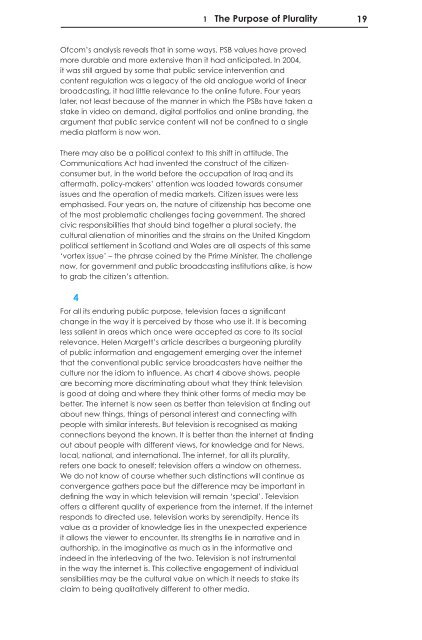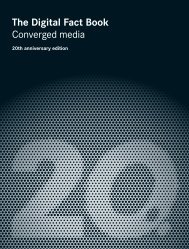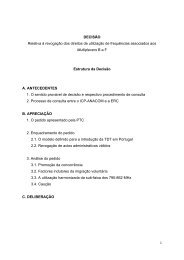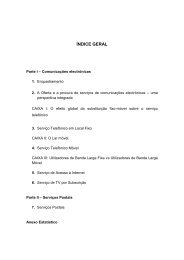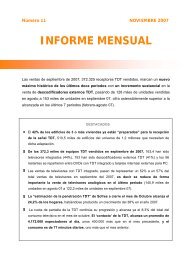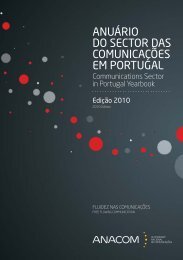The Price of Plurality - Stakeholders - Ofcom
The Price of Plurality - Stakeholders - Ofcom
The Price of Plurality - Stakeholders - Ofcom
Create successful ePaper yourself
Turn your PDF publications into a flip-book with our unique Google optimized e-Paper software.
1 <strong>The</strong> Purpose <strong>of</strong> <strong>Plurality</strong>19<strong>Ofcom</strong>’s analysis reveals that in some ways, PSB values have provedmore durable and more extensive than it had anticipated. In 2004,it was still argued by some that public service intervention andcontent regulation was a legacy <strong>of</strong> the old analogue world <strong>of</strong> linearbroadcasting, it had little relevance to the online future. Four yearslater, not least because <strong>of</strong> the manner in which the PSBs have taken astake in video on demand, digital portfolios and online branding, theargument that public service content will not be confi ned to a singlemedia platform is now won.<strong>The</strong>re may also be a political context to this shift in attitude. <strong>The</strong>Communications Act had invented the construct <strong>of</strong> the citizenconsumerbut, in the world before the occupation <strong>of</strong> Iraq and itsaftermath, policy-makers’ attention was loaded towards consumerissues and the operation <strong>of</strong> media markets. Citizen issues were lessemphasised. Four years on, the nature <strong>of</strong> citizenship has become one<strong>of</strong> the most problematic challenges facing government. <strong>The</strong> sharedcivic responsibilities that should bind together a plural society, thecultural alienation <strong>of</strong> minorities and the strains on the United Kingdompolitical settlement in Scotland and Wales are all aspects <strong>of</strong> this same‘vortex issue’ – the phrase coined by the Prime Minister. <strong>The</strong> challengenow, for government and public broadcasting institutions alike, is howto grab the citizen’s attention.4For all its enduring public purpose, television faces a signifi cantchange in the way it is perceived by those who use it. It is becomingless salient in areas which once were accepted as core to its socialrelevance. Helen Margett’s article describes a burgeoning plurality<strong>of</strong> public information and engagement emerging over the internetthat the conventional public service broadcasters have neither theculture nor the idiom to infl uence. As chart 4 above shows, peopleare becoming more discriminating about what they think televisionis good at doing and where they think other forms <strong>of</strong> media may bebetter. <strong>The</strong> internet is now seen as better than television at fi nding outabout new things, things <strong>of</strong> personal interest and connecting withpeople with similar interests. But television is recognised as makingconnections beyond the known. It is better than the internet at fi ndingout about people with different views, for knowledge and for News,local, national, and international. <strong>The</strong> internet, for all its plurality,refers one back to oneself; television <strong>of</strong>fers a window on otherness.We do not know <strong>of</strong> course whether such distinctions will continue asconvergence gathers pace but the difference may be important indefi ning the way in which television will remain ‘special’. Television<strong>of</strong>fers a different quality <strong>of</strong> experience from the internet. If the internetresponds to directed use, television works by serendipity. Hence itsvalue as a provider <strong>of</strong> knowledge lies in the unexpected experienceit allows the viewer to encounter. Its strengths lie in narrative and inauthorship, in the imaginative as much as in the informative andindeed in the interleaving <strong>of</strong> the two. Television is not instrumentalin the way the internet is. This collective engagement <strong>of</strong> individualsensibilities may be the cultural value on which it needs to stake itsclaim to being qualitatively different to other media.


